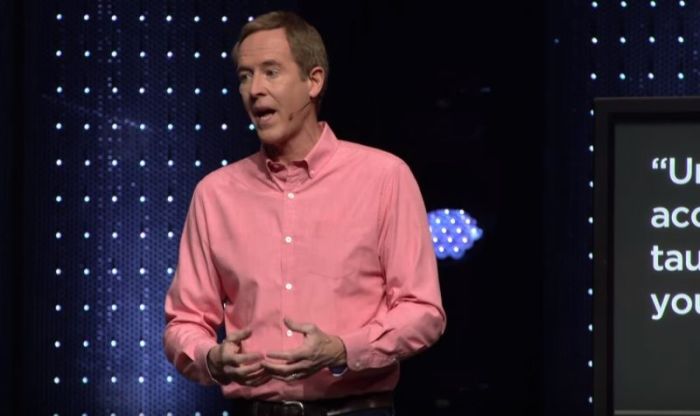'God Is Love' a 'Uniquely Christian Idea,' Argues Andy Stanley in New Book

The concept of a loving God is a "uniquely Christian idea," says North Point Community Church Senior Pastor Andy Stanley in his newest book.
Titled Irresistible: Reclaiming the New that Jesus Unleashed for the World, Stanley's latest book was released Tuesday by Zondervan.
In chapter 18, Stanley wrote about the New Testament book of 1 John, at one point focusing on 4:16, which reads in part "God is love. Whoever lives in love lives in God, and God in them."
"John equated God with love. This was novel. This was unique. This would change the world," wrote Stanley. "God is love is a uniquely Christian idea."
To justify his theological argument, Stanley contrasted Christian belief in a loving God with the religious views of both Near East paganism and Judaism.
"No one credited the pagan gods with being love or loving. They were jealous, fickle, capricious, and entertained themselves by trifling in human affairs," Stanley explains.
"For Jews, God was holy. Separate. Unapproachable. He lived behind a curtain. His love was reserved for his covenant people."
Stanley describes John's "God is love" statement as being "epic," especially given that it was likely written around the time of the Roman sacking of Jerusalem.
"Many of us have a difficult time believing God is love in light of the suffering we read or hear about," he continues. "John witnessed unspeakable horrors firsthand. Yet he concludes, God is love."
Irresistible was written in response to the rise in the number of Americans who have left Christianity and identify as atheist or "religiously unaffiliated."
"'The Bible says . . .' doesn't carry the weight it once did and thanks to our digital world, folks know 'what else' the Bible says without even picking up a Bible. In spite of this, we preach, teach, write, and communicate as if nothing has changed. As if 'The Bible says it,' still settles it," noted the book's official description.
"According to author and church leader Andy Stanley, it's time to hit pause on much of what we're doing and consider the faith modeled by our first-century brothers and sisters who had no official Bible, no status, and humanly speaking, little chance of survival."
Blending Old And New Covenants
In much of the book, Stanley makes the argument that a key problem with modern American Christianity is that it keeps treating the Old Testament and the New Testament equally.
Referring to "old covenant leftovers," Stanley argues that Christians have "an uncomfortable history and habit of selectively rebranding aspects of God's covenant with Israel and smuggling them into the ekklesia of Jesus."
Stanley cites as examples violent episodes in Christianity like the persecution of religious minorities after Christianity became the Roman Empire's state religion and the Crusades.
"Modern historians have made a compelling case that the crusades were justified in light of their geopolitical context," wrote Stanley.
"What no one attempts to justify is the way church leaders leveraged Scripture to inspire the wealthy and poor alike to make the perilous journey east to expel the Saracens from the Holy City."
Stanley wrote in chapter 8 that while it was important and "divinely ordained," the covenant God made with ancient Israel was "temporary."
"Careless mixing and matching of old and new covenant values and imperatives make the current version of our faith unnecessarily resistible," he adds.
The Backlash
Ahead of the book's release this month, Stanley garnered controversy for his claims that Christians should, as he once put it in a sermon from April, "unhitch" themselves from the Old Testament.
Some accused the megachurch pastor of advancing the early church heresy Marcionism, which maintained that the God of the Hebrew Bible was not the God of the New Testament.
"[Stanley's sermon] can really only be described as an elaborate and educated flirtation with the old Christian heresy of Marcionism—the belief that the Old Testament is not authoritative in matters of Christian doctrine and morals," wrote Wesley Hill of Trinity School for Ministry in a column for First Things in May.
Messianic Jewish author and radio personality Michael Brown also denounced Stanley's sermon comments.
"A pastor as influential as Andy Stanley needs to distance himself from such heresies, making a public, clear, and unequivocal correction that undoes the confusion he has caused. (He knows that I write this [as] a friend, out to help, not to hurt.)," wrote Brown.
"He can preach against legalism and against Judaizing, exalting the grace of God and celebrating the newness of the New Covenant, without undermining the very foundations on which that New Covenant is established."
For his part, Stanley explained that critics needed to understand the context, especially since his remarks were more for an audience that is turned off by biblical arguments.
"I told my kids growing up, if anyone ever asks you 'do you believe Adam and Eve are real people?' here is how you are to answer: do not say 'yes because the Bible says Adam and Eve were real people,'" commented Stanley in an interview with Brown in July.
"You say this: 'I believe Adam and Eve were historical characters because Jesus did. And when somebody predicts their own death and resurrection and pulls it off, I go with whatever they say.'"




























